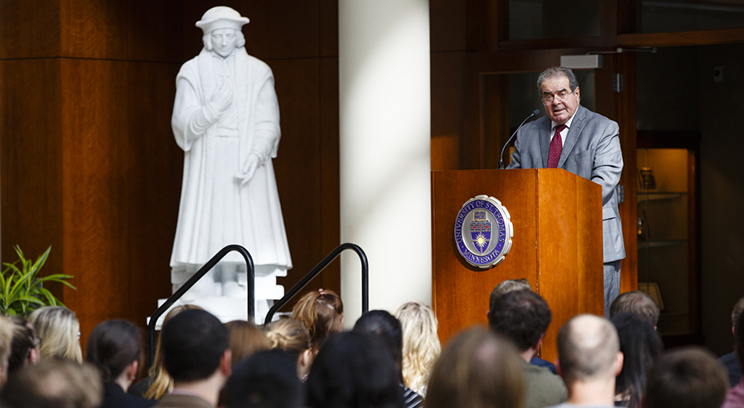In the days since Supreme Court Justice Antonin Scalia’s death, several members of the faculty at the University of St. Thomas School of Law have reflected on Scalia’s career, his visit to St. Thomas Law in October 2015 and the future of the Supreme Court. Below are excerpts from each of their writings.
“Antonin Scalia was no defender of that sloppy sophism, a 'living constitution.' The Constitution’s meaning was, for Scalia, fixed by the original linguistic meaning of its words and phrases, taken in historical and political context, at the time of their adoption by the People as part of their Constitution. Yet Scalia unfailingly made that original meaning of the Constitution come very much alive, with his lively writing and irrepressibly warm and colorful judicial personality.” —Professor Michael Stokes Paulsen, in “Scalia at St. Thomas: Closing Arguments,” for Public Discourse. Read full article.
“Moreover, except for Ruth Bader Ginsburg, it is hard to imagine another justice becoming so visible in the broader culture. Many who hated Scalia’s rulings could not help but be entertained by his razor-sharp writing, which he used especially in his dissenting opinions to carve up the majority’s reasoning (my favorite is Planned Parenthood v. Casey, where among other things he referred to the majority’s 'Nietzschean vision of us unelected, life-tenured judges—leading a Volk who will be ‘tested by following’' the Court’s rulings obediently). In a talk at my law school last November, he said that he wrote his dissents “mainly for you guys, for law students.” His eloquence inspired generations of lawyers and students convinced by his judicial philosophy.” —Professor Thomas Berg, in “Antonin Scalia: Devout Christian, Worldly Judge,” for Christianity Today. Read full obituary.
“A powerful reminder to generations of students that a life in the law should be marked by intellectual vigor.” —Dean Robert K. Vischer, on Twitter. Follow @DeanVischer.
“Am I demanding that Obama find and nominate a former defense lawyer from the Midwest who went to Hamline and counts herself a Methodist? Of course not. But in the hopper with everything else, these aspects of a potential nominee deserve consideration. Each of them — schooling, geography, faith and knowledge of the hardships criminal law inflicts — has power to shape the conscience of that potential future justice who will shape the nation.” —Professor Mark Osler, in “Supreme Court needs a broader definition of diversity,” for the Star Tribune. Read full op/ed.
“One of Justice Scalia’s most striking characteristics was his openness and curiosity about the parade of people who came across his path. The fact that his friendships crossed all typical lines of politics, faith, age, and background is a testament to his generosity of spirit.” —Professor Elizabeth Schiltz, in "Remembering Justice Scalia," for Mirror of Justice. Read full post.







